OLD TESTAMENT READING: Exodus 32-33:23
TODAY’S HEADLINES:
- ISRAELI LEADER MISSING ON MOUNTAIN, SUSPECTED DEAD
- FAVORITE EGYPTIAN IDOL MAKES COMEBACK IN WILDERNESS CONCERT
- MOSES DISRUPTS FESTIVAL WITH DRAMATIC DISPLAY FOR LAW-BREAKERS
- HIGH LEVEL MEDIATION SAVES PEOPLE FROM DESTRUCTION
- YOUNG JEWISH LEADER, JOSHUA, APPOINTED AS ASSISTANT TO MOSES
Chapters 32-34 form a parenthetical section in the Book of Exodus interrupting the revelation of the Law that Moses was given on Mount Sinai. In these chapters we learn what was happening at the base camp while Moses was on the summit for forty days.
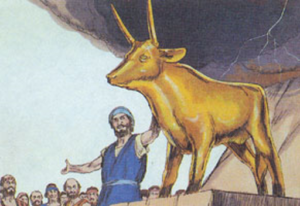 The people of Israel had experienced God’s presence in an awe-inspiring worship service in which the Lord came down at Mount Sinai in the sight of all the people with thunder, lightning, smoke, earth tremors, and loud trumpet blasts (Exodus 19:16-20). After Moses had read the Book of the Covenant, the seventy elders were invited to come up the mountain and celebrate a covenant meal in the Lord’s presence with Moses and Aaron and his sons. To their delight they saw the God of Israel standing on heavenly pavement (Exodus 24:9) much like the vision the Apostle John had on the island of Patmos (Rev 4:6 and 15:2). The Lord prepared a table for them in His presence. In spite of their having experienced the Lord in such dramatic ways, their foolish hearts were soon forgetful and, with Moses’ long absence, they turned to idolatry.
The people of Israel had experienced God’s presence in an awe-inspiring worship service in which the Lord came down at Mount Sinai in the sight of all the people with thunder, lightning, smoke, earth tremors, and loud trumpet blasts (Exodus 19:16-20). After Moses had read the Book of the Covenant, the seventy elders were invited to come up the mountain and celebrate a covenant meal in the Lord’s presence with Moses and Aaron and his sons. To their delight they saw the God of Israel standing on heavenly pavement (Exodus 24:9) much like the vision the Apostle John had on the island of Patmos (Rev 4:6 and 15:2). The Lord prepared a table for them in His presence. In spite of their having experienced the Lord in such dramatic ways, their foolish hearts were soon forgetful and, with Moses’ long absence, they turned to idolatry.
For they exchanged the truth of God for a lie, and worshiped and served the creature rather than the Creator (Romans 1:25).
The people were impatient for Moses to return. The delay causes them to lean on their own understanding. The One True God is no longer set before them. Instead of relating to the Lord as foremost in their hearts and minds (COMMANDMENT #1), they see Moses as the “man who had brought them up out of Egypt” and were judging him as a failure. The disgruntled crowd gather around Aaron and put the pressure on, saying, “Come, make us a god who will go before us; as for this Moses, the man who brought us up from the land of Egypt, we do not know what has become of him.”
They preferred a god of their own making, one that they could see, touch, and control. “Make us a god who can lead us where we want to go, when we want to go, and how we want to go!”
Idolatry is lifting other things up to the level of God. This is a violation of the First Commandment, to have no other gods before you. Idolatry is also a lowering of God to the level of other things. This is a violation of the Second Commandment. The violation of the first is to put a created thing in the place of God and the second is to make God like a created thing. Instead of recognizing that God is God and we are made in God’s image, idolatry is when we say that we are god and we make God after our own image.
 In his book, “Counterfeit Gods”, Tim Keller claims that an idol is anything that is more important to you than God, anything that absorbs your heart and imagination more than God, or anything you seek to give you what only God can give. Idolatry is when we put the finite and limited in the place of the Infinite and Ultimate.
In his book, “Counterfeit Gods”, Tim Keller claims that an idol is anything that is more important to you than God, anything that absorbs your heart and imagination more than God, or anything you seek to give you what only God can give. Idolatry is when we put the finite and limited in the place of the Infinite and Ultimate.
In Moses’ absence, the children of Israel returned to their old ways. The Book of Joshua tells us that in Egypt many of them had practiced idolatry (Joshua 24:14) and were still carrying these idols with them into the Promised Land! John Calvin rightly said that our hearts are idol-making factories.
One of the principal gods of Egypt was named ‘Apis’ who was pictured in the form of a calf, or an ox. The Psalmist tells us about this low point in the history of God’s people:
“They made a calf in Horeb and worshiped a molten image. Thus they exchanged their glory for the image of an ox that eats grass. They forgot God their Savior, who had done great things in Egypt. (Psalm 106:19-21)
Aaron asked for the gold rings in the ears of their wives, sons, and daughters. He melted the gold and fashioned it with a graving tool into a golden calf. When Moses comes down from Mount Sinai to confront Aaron’s disobedience, Aaron’s account of his behavior is quite different: “I threw the gold into the fire, and out came this calf!” (Exodus 32:24).
 Aaron sees the enthusiastic response of the people to the newly fashioned god and he becomes a popular man! He builds an altar for sacrifices to be offered. The offerings that were to speak exclusively of the total devotion of Christ to the Father (the burnt offering) and the purity of fellowship that we can have with God through the mediation of Jesus (our peace offering) are now prostituted in the service of a self-styled idol.
Aaron sees the enthusiastic response of the people to the newly fashioned god and he becomes a popular man! He builds an altar for sacrifices to be offered. The offerings that were to speak exclusively of the total devotion of Christ to the Father (the burnt offering) and the purity of fellowship that we can have with God through the mediation of Jesus (our peace offering) are now prostituted in the service of a self-styled idol.
Aaron proclaims a feast day when there were to be no feast days (in the third of fourth month). The people sat down to eat and drink and rose up to play (32:6). This failure to keep their pledge of pure devotion did not go unnoticed by the Lord who knows our every action of sitting down and rising up (Psalm 139:1-2). The Lord knows what is going on in our hearts. He observes the idolatries that take place at the base camp in our lives.
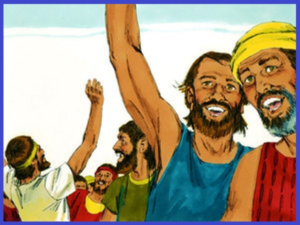 The Lord makes known His burning anger against the sin of His “stiff necked” people. Moses once again intercedes for his people. Here Moses is a type of a more True and Greater Mediator, Jesus Christ.
The Lord makes known His burning anger against the sin of His “stiff necked” people. Moses once again intercedes for his people. Here Moses is a type of a more True and Greater Mediator, Jesus Christ.
Moses pleads with God to change His mind and not destroy His people. He appeals on the basis of the fact that He had rescued them with His power (32:11). He appeals to God that He spare His people from their deserved punishment for the sake of the Gentiles to whom Israel was to bring a blessing and by whom God’s Name would be honored (32:12). Moses pleads mercy on the basis of His covenant promise made Abraham, Isaac and Israel. (Notice the appeal is on the basis of Jacob’s new name, as the new man, Israel). This intercession is a picture of God forgiving for His own name’s sake. We see this as a developing pattern. (Psalm 106:7, 8; 25:11; Isaiah 43:25; 48:9-11)
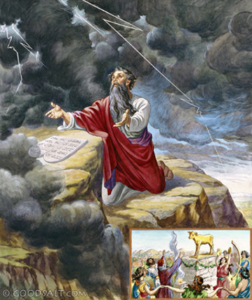 In intercession Moses puts himself on the line, like Paul interceding for the Jews (Romans 9:3), but none other than Jesus Christ could be a substitute able to bear God’s wrath on behalf of the guilty. Moses prays, “But now, if You will, forgive their sin-and if not, please blot me out from Your book which You have written!”
In intercession Moses puts himself on the line, like Paul interceding for the Jews (Romans 9:3), but none other than Jesus Christ could be a substitute able to bear God’s wrath on behalf of the guilty. Moses prays, “But now, if You will, forgive their sin-and if not, please blot me out from Your book which You have written!”
The pattern of the Tabernacle reminds us that sin must be dealt with.
The Lord hears Moses pleading and relents.
“So the LORD changed His mind about the harm which He said He would do to His people.” (Exodus 32:14)
He disciplines the Israelites but He does not consume them.
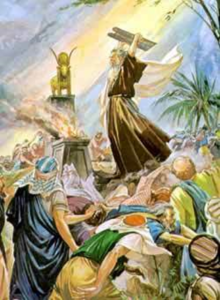
When Moses goes down to the people at the base of the mountain to confront the people, he calls for people to declare their loyalty. Only the Levites at first identify with Moses and choose to worship the Living God. They are asked to punish the unrepentant idolaters who have chosen to be led by their own passions in service of the golden calf.
There is a contrast between Exodus 32 and Acts 2. Moses comes down from Mount Sinai with the Law of the First Covenant in Exodus 32; The Holy Spirit descends from heaven to put the law in the hearts of believers in the New Covenant. In Exodus 32:28 three thousand people die. In Acts 2:41, three thousand people come alive in Christ. The letter kills, but the Spirit gives life (2 Cor 3:6).
In Exodus 33, Moses meets with the Lord in the Tabernacle. The pillar of cloud descends and stands at the entrance of the gate when Moses entered the tent. There the Lord calls Moses to resume his journey.
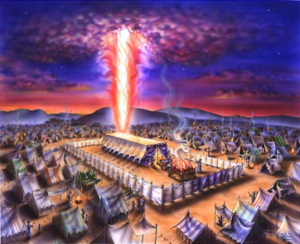 “Thus the LORD used to speak to Moses face to face, just as a man speaks to his friend. When Moses returned to the camp, his servant Joshua, the son of Nun, a young man, would not depart from the tent.” (Exodus 33:11)
“Thus the LORD used to speak to Moses face to face, just as a man speaks to his friend. When Moses returned to the camp, his servant Joshua, the son of Nun, a young man, would not depart from the tent.” (Exodus 33:11)
This is the first time that Joshua is mentioned as Moses’ servant. Notice how Joshua’s actions reveal where his heart was. May we abide in Christ with a resolve similar to that of Joshua “who would not depart” from the tabernacle that bore the good news of fellowship with God in His Presence.
THE NEW TESTAMENT READING: MATTHEW 26:69-27:14
Sadly, we see how Peter’s claim of ‘faithful unto death” was proved to be a flimsy one. In this account Peter finds himself denying Jesus publicly, with an oath, and then with cursing and swearing. (Matt 26:69-75).
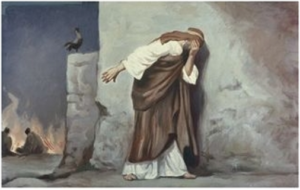 The Sanhedrin condemned Jesus to death on the charge of blasphemy but had no legal right to execute him. They would have to deliver Jesus to the Roman governor.
The Sanhedrin condemned Jesus to death on the charge of blasphemy but had no legal right to execute him. They would have to deliver Jesus to the Roman governor.
Judas suddenly feels remorse for “betraying innocent blood”. He wants to return the 30 pieces of silver. He throws it into the sanctuary and then he goes away to hang himself. The chief priests recognize that they cannot use blood money for a holy purpose and instead they buy the Potter’s Field for burying foreigners. The cemetery became known as “the Field of Blood”.
When Jesus is brought before Pilate, He answers Pilate’s question, “Are you the King of the Jews?” with “It is as you say”.
TODAY’S READING IN PSALMS- Psalm 33:1-11
Verses 1-3 call us to worship- to sing for joy, to praise, to give thanks, and to do it with the skillful playing of musical instruments!
Verse 4-5; We praise the Lord for His self-revelation in the Scriptures!
Verses 6-9; We praise the Lord for His Sovereign power over all creation!
 Verses 10-11; We praise the Lord for the Supremacy of His counsel over that of the nations!
Verses 10-11; We praise the Lord for the Supremacy of His counsel over that of the nations!
Psalm 33:11 11 The counsel of the LORD stands forever, The plans of His heart from generation to generation.
“To rejoice in temporal comforts is dangerous, to rejoice in self is foolish, to rejoice in sin is fatal, but to rejoice in God is heavenly.” – Charles Spurgeon; The Treasury of David.
TODAY’S READING IN PROVERBS: Proverbs 8:33-36
Proverbs 8:34 lists three ingredients for SPIRITUAL ATTENTIVENESS:
A hearing ear- “Blessed is the man who listens to me…” Do you have a habit of spending some quiet time with the Lord when you reflect on what God has said in His Word? Do you incline your ear to hear His voice? What has the Lord spoken to your heart today through His Word?
A watchful eye- “Watching daily at my gates…” How have you seen the Lord at work today?
An expectant Heart- “Waiting at my doorposts.” What are you trusting the Lord for today?
Draw near to the Lord and He will draw near to You (James 4:8). Go to His door and His gates. There you will hear, see, and wait with expectancy. All that He has promised, He will provide.
PRAYER– Father, in today’s readings we have been reminded of the fickleness of the human heart. Our own hearts are prone to idolatry. We are made to worship but that desire is too often directed to that which is unworthy. We are prone to overclaim our faithfulness, like the children of Israel at Sinai, or Peter on the eve before Christ’s crucifixion. We pledge loyalty but easily succumb to our baser instincts. Forgive us of our idolatries. We thank You for Your relentless pursuit of our deliverance. We are grateful for Your steadfast love, demonstrated in the redeeming work of Your Son, our Lord and Savior. We look to Him with fresh faith. We come to Your Word with hearing ears, we look for You with watchful eyes, and we wait on You with expectant hearts, in Jesus’ Name. Amen.
Pastor David
P.S. Today we are praying for Albania (p. 95-96 of the new edition of “OPERATION WORLD”)
https://www.operationworld.org/alba

Need a copy of Operation World? They are available at New Life Community Church in Concord for $15 or you can purchase them online at this link:
https://www.biblicadirect.com/c-316-operation-world.aspx
Download the Operation World Prayer App:
https://apps.apple.com/us/app/operation-world/id1181609244?ls=1
https://play.google.com/store/apps/details?id=org.missionaldigerati.operationworld&hl=en
